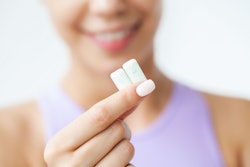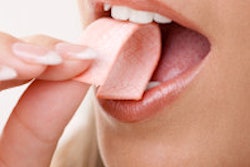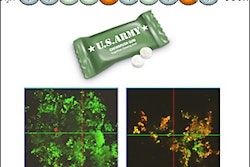Thanks to research conducted at the University of Kentucky College of Pharmacy, soldiers could one day carry a type of chewing gum that will prevent dental decay.
The cavity-fighting gum, developed for soldiers who are deployed in areas where they often don't have the time or the means to brush or floss, is about to undergo phase I clinical testing, according to a university press release.
The chewing gum contains an antimicrobial, KSL, which is an antiadhesive and abrasive agent that disrupts plaque formation and promotes the dissolution of plaque. The goal is to reduce plaque on the teeth when normal oral hygiene is not possible.
The research is being funded by the U.S. Army Dental Research Detachment. Currently, the U.S. Department of Defense is seeking a manufacturer to produce the gum for clinical trial purposes.
The gum was developed by pharmacy professor Patrick Deluca. Last fall, Abeer Al-Ghananeem, assistant professor of pharmaceutical sciences, took over as principal investigator of the project when DeLuca was elected president of the American Association of Pharmaceutical Scientists.
"My research group has been developing novel drug delivery systems for the past 20-30 years," DeLuca said in an e-mail to DrBicuspid.com. "The U.S. Army Dental Research Detachment learned of our work about five years ago and contacted me informing me that they were interested in having an antimicrobial/antiplaque device which the soldiers could use in field (battle zones) when they were unable to brush their teeth. The gum is intended to be used as an adjunct and to provide some form of oral hygiene measure in the face of excluded oral hygiene like some of deployed soldiers are experiencing. It is not meant to replace brushing, but to serve as an adjunct when brushing is not possible."
DeLuca's group utilized its existing novel polymeric microparticulate drug delivery technology to incorporate the active ingredient, a decapeptide, into a gum base. The active ingredient releases from the gum slowly upon chewing (over a 20-minute period). Because some of it will adsorb to the teeth, that extends the residence time in the mouth, DeLuca noted.
So far, all research has been outside the human body inside a laboratory. Al-Ghananeem's lab contains a chewing machine, property of the U.S. Department of Defense, which actually simulates the human body chewing complete with artificial saliva.
Further studies will determine if the gum will be marketed as an over-the-counter product or by prescription. Al-Ghananeem says she is optimistic that within 18 months to two years that the phase I trial will be completed and data provided.
The gum could also have great impact on their health and quality of life but it also has a global impact, especially in third world countries, according to Al Ghananeem.
"Children born with AIDS in Africa have serious and painful dental problems and I see the gum as a way to enhance the quality of their life," she said. "While the focus of the research is on the troops, so many other possibilities exist."



















